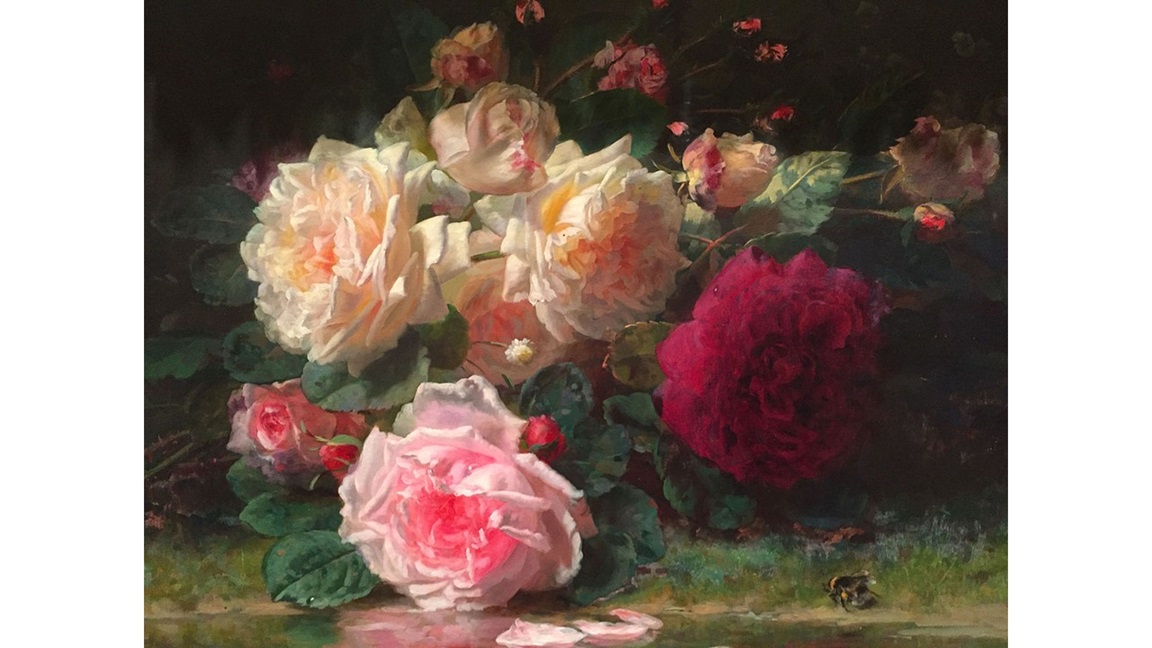.
In Extremis
—from the Western wilds
Here at the most attenuated ends
Of America’s arterial transport map,
Where pavement stops, dissolves to native dust,
I find I’m mostly mindful of defense:
Where hedgerow thorns have failed to fill a gap,
Or chain link steel has rotted into rust—
As if these concerns in concert make an answer
Sufficient to the cities’ spreading cancer.
It wasn’t always so. I tried to obey.
But the creed we’re now expected to believe—
That children change their sex with just a thought,
That those must give who least can afford to pay,
And criminals must only get reprieve,
So that, in league with politicians bought
By China, they’ll join to bring a paradise
Of stolen goods and consequence-free vice—
Is too extreme to not foment disasters.
Its tidal wave, rushed in from every coast,
drowned nearly every voice that might protest.
Meanwhile, the swarm, beckoned by its masters,
Bursts north from the border to infest the host.
We’re left with scraps, and they devour the rest.
I take my cue from lizards, still in their furrows;
from rabbits ever watchful for their burrows.
The war drums’ booming grows against “cis” whites
In rants backed up by guns and fascist red
Which brand as “criminal” our hints of doubt.
We’ve fled, decamped, demurred at all the fights,
and shut our mouths, all slanders unresisted.
My defense, I know, will fail: Each day I range out
Into the wild, on an ever-further track;
I linger ever longer coming back.
.
.
Memorial Day, Chicago
Downtown is packed, a mass of marching feet.
Stacked chicks patrol along Division Street.
The Hancock tower, a tall block stretching dark,
Shades shoppers trooping up each avenue,
And weekend chefs from every yard imbue
The air with a pungent haze of barbecue.
On the Eisenhower, traffic’s fully crammed in.
From the West on Washington, the South on Cannon,
In squads, where Lincoln guards his general’s park,
Stream flip-flopped families, armed with chairs and bug spray.
With beetled brow he sternly approves their day
Of beaches, picnics, concerts, food, and play.
The lakefront’s long and calm with gulls and bikes.
None hark to distant guns or scan for air strikes;
Instead the boys watch the babes and the moms their tykes—
The sun and fun our soldiers bled and died for.
Today, at least, let’s pray we don’t ignore
Our lives of playful peace were bought with war.
.
.
Adam Wasem is a writer living in Utah.

















This is superb work. Congratulations, and thanks.
Thank you, Gerry.
“In Extremis” is filled with those terrible truths that beset us. In the second poem, you exhibit a detailed knowledge of Chicago and provide an apt obliviousness of the denizens to all the freedoms and privileges they enjoy bought by war and the blood of soldiers. Nicely done, although I was looking for a little more on the tragic criminal and homicidal violence perpetrated within the city.
Thank you, Roy. My approach here was subtler, both to emphasize the obliviousness and ignorance you me mentioned, but also because I’m afraid sometimes of sounding like a broken record endlessly railing against the evils of urban degeneration so evident today. Hopefully it comes across that the obliviousness itself is what leads to the rot and violence.
“With beetled brow he sternly approves their day
Of beaches, picnics, concerts, food, and play.”
Love this image. Spare a thought for the past that, despite it all, surrounds and watches over us, strive to live up to its stern but reasonable standards. There is no real fun apart from the hope for fatherly approval.
Thank you, Monika, I’m glad you noticed. I like how that turned out, too. The image is doubly ironic since not only is the contrast of the grave wartime visage of Abraham Lincoln approving beachgoers’ holiday fun times amusing, but also Lincoln, like every other wartime general or president mentioned in the poem, has been “cancelled” by the radical left several times over already; nowadays they’re only ever mentioned sneeringly, as relics of our barbaric atavistic past, if they’re even acknowledged at all.
I agree with Gerry — both poems are excellent. But I’m especially impressed with “In Extremis”, for both its profound content, and its poetic finesse in articulating that content. The first verse is such a memorable description, which then ends in a surprising yet perfect summary: the image is of “the cities’ spreading cancer”. The phrase “consequence-free vice” is also just exactly right, yet has a why-didn’t-I-think-of-that feeling to it. I also really liked your interesting rhyme schemes in both poems.
Thank you, Cynthia, for that high praise. I hoped that image would come together surprisefully, of the cancer from the cities spreading to the smallest capillary ends of the country’s arterial road map–I’m glad to see it did with you. And I like to invent rhyme schemes when I can. It’s fun to invent, it wakes the reader up with the thrill of the novel, and I find it easier to avoid falling into some of the sing-songy greeting-cardy rhyming traps if it’s an invented, or at least very uncommon, rhyme scheme. Also my work is so deliberately colloquial, trying to use conventional schemes rarely seems to properly gel.
Both of these strong poems are filled with vivid language and imagery, Adam — they bring home the moral and sociological points you make with aplomb and a use of colloquial language which does not in the least undermine the presence of meter and rhyme. It’s as if the best of contemporary poetry has discovered the sheer power of discipline.
In Extremis is full of observant truths. The swarm infesting the host just about says it. As for your Memorial Day poem… “Flip-flopped families armed with chairs and bug spray.” Wow. Inelegant, perhaps, but so very right. This is classical poetry for the 21st Century.
Thank, Brian, I hoped you’d enjoy them and have a comment for me. My dream with my more “editorial” poetry is to have the most jaded philistine start reading just because he’s bored and the language goes down like ice cream, realize halfway through he’s reading an actual poem but not care because its like reading his inner monologue, and end up an ecstatic lover of poetry because he had no idea it could be like this. My favorite moments in the open-mic readings I used to go to were the couple of occasions when I would finish my little reading and see a teenage kid pull out a scrap of paper and start scratching out his first poem, and then in addition have the nerve to get up and try to read it, having never thought he had a poet in him before that moment.
Interesting observations on the current state of affairs in America from a particular viewpoint.
I wonder if Native Americans saw the white man as a swarm infesting their ancestral land from the Eastern Seaboard.
Thanks for the reads, Adam.
Interesting analogy, Paul. Are you saying the mass immigration from third-world countries into Western countries is also an invasion? If so, then you and I are in agreement on a political issue for the first time, as history has proven those Europhobic red nationalists right about mass immigration.
As an aside, I can’t imagine Indians like the term “Native American” a whole lot, because of the American part. If another country had conquered the United States at some point, I wouldn’t want to my nationality to be named after them with something like “native New German” or “native New Russian” or whatever.
Yes, mass immigration always radically changes the extant culture of an area. When said mass immigration is overwhelmingly composed of semi-literate third world peasants, it is fair to say that in addition to a radical shift in culture, you can expect any social safety net to be strained to the breaking point, for the immigrating population to have virtually no understanding or appreciation for the existing social contract, as well as other fun and exciting prizes.
‘Non-Invasive’ Population, perhaps?
The Native Americans were nomadic hunter gatherers with no maps, written language, or technology beyond Stone Age tools before Europeans settled and began to build. I doubt they initially saw Europeans as anything more than an exceedingly unusual new tribe with firewater and flintlocks that would make them almost impossible to conquer with the usual tribal warpath tactics.
Adam, these are both really good. The first one captures how all of us who are concerned about the leftist conquest of the world feel about what’s going on. The second one, the last stanza really says it all. The imagery in both is striking, clear, and succinct. Well done!
Thank you Joshua, I’m glad you enjoyed them. I appreciate that you feel I effectively voiced some of our concerns. And I felt fortunate that the last stanza of “Memorial Day” came together as well as it did, to the point that my deviation from the previous two stanzas’ rhyme scheme was minimally distracting, at least to you.
Adam, “In Extremis” as title is very well chosen. It has to do with both the social situation you describe, and with your personal attempt to escape it by leaving heavily urbanized America. Neither extreme is hopeful, as your style manages to convey. Earlier today, I was sitting in a burger place with some friends who often meet there. It is on the way between regions of city sprawl. We remarked on beginning to see homeless persons wandering the area. How did they get there? And why did they come to a place where they could expect nothing, except to be shooed away by police if a business owner should become annoyed enough to call? As you say, it’s the spread of cancer that the city cannot contain. Human beings have immense worth, but social services meant to help them are nothing but paying jobs for others who conform better to the expectations of authorities. I do see good done by private charities, sometimes in cooperation with law enforcement, but these groups mostly respond to immediate needs. What an immense task it is to “rescue” even one individual from the blight, such that he or she does not return! Most of us (again, as you say) need to be concerned with “defense” of ourselves and our families.
The Memorial Day poem, like the earlier one, has a crisp ending packed with meaningful summary of what you’ve said. This is something that lifts it above colloquial poem reportage. And this one has the scenic description that provides significant backdrop, as well as reader satisfaction.
Thank you, Margaret, for that extremely close and attentive read. The multiple-entendre title was a happy inspiration, and I’m glad you noticed the connection between the poems style and mood. Whenever I’m trying to convey a sense of resignation or hopelessness I always find myself lapsing into longer sentences and a more and more passive voice—they just seem to naturally fit. I wanted to capture the sense of resignation and the inevitable course of action that naturally arises in a moral yet sensible and realistic person upon finding themselves abruptly an unjustly persecuted minority: if the cancer is going to spread through the entire circulatory system, then no matter the defense, eventually, to survive, you’re going to have to go beyond its reach, where the roads end. Rampant homelessness spreading throughout the suburbs is a telling symptom of the societal breakdown. As government, through so-called compassion, usurps the prerogatives of churches and charitable institutions, the end result is always nanny-state totalitarianism, which ultimately ends up impoverishing the citizenry through ever-growing taxation, while helping virtually no one.
Both of these works and demonstrate the high quality of craftsmanship I have come to know and enjoy from this poet. “In Extremism” is particularly poignant and sobering, a somber reflection on where we are and what is to come. Excellent work!
Thank you, Adam. I’m gratified you appreciate the craftsmanship and that you caught the reflective mood. Two of the main problems I see with poetry today are that too many allow the art of poetry to blind them to the craft, and that too many are enraptured by the rhetorical power of poetry at the expense of the reflective. Too many harken exclusively to the poetic whirlwind and not enough to the still, small voice.